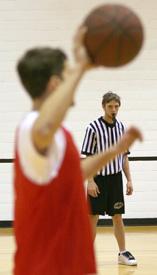When James Edwards walked off of the Upper Miller Fields after the fraternity league soccer championship, he didn’t expect to be involved in a confrontation. What he faced, however, was a barrage of insults and instructions from members of the losing team to meet them on the football fields.
Edwards, a sophomore in biological sciences, was officiating the championship game and said he didn’t see the point of any hostility.
“At the end of the game, the score was like 4-1 or 4-2, and he wanted to come up to me and start fussing about that one call,” Edwards said. “Then him and his boys were on the sidelines, like trying to get their guys to come jump me and stuff.”
Jason Spivey, the assistant director of intramural sports, said while the issue of referees being taunted is not uncontrollable, it is something that has to be addressed.
“It is something that we deal with regularly,” Spivey said. “It has not gotten to a point where it’s over the top, but it is something that we have to deal with.”
Edwards, who officiates soccer and basketball games, doesn’t mind the disrespect usually, but he doesn’t appreciate when it moves to a personal level.
“One of my co-referees got picked on about being a little bit heavy, got some words said to him,” Edwards said. “I was ready to fight them. I was ready to whoop their tail right then and there. That was just improper.”
Jonathan Milliner, a sophomore in electrical and computer engineering, officiates flag football and basketball games. He said referees must be prepared, especially when feelings start getting intense.
“I’m ready for anything. I have felt like people are pretty hostile. I have seen people come off like throwing stuff and punching stuff,” Milliner said.
“It’s like come on, if you fight with one of us, if you throw a punch at us, you can get kicked out of school. For an intramural game? Come on, buddy.”
According to Spivey, sometimes as many as two-to-three people get ejected from games in a given week, but that soccer season is the worst in terms of officiating conflicts.
“The skill level of the soccer players we have is so much greater than the level of officiating we have,” Spivey said.
“So, when you have a higher skill level of soccer players that’s used to playing at a high level, and then you have an official that comes in that’s used to reffing recreational league games, its hard to mesh those two together into something that works.”
Like Spivey, Milliner cites the lack of training as a source of trouble.
“We get trained, but we’re not professional officials. We don’t go through like a year of training or anything,” Milliner said. “It’s like two weeks or three weeks, and it’s not three weeks back to back. We’ll meet like twice a week.”
Milliner advised participants in intramural sports to empathize some with the officials.
“I’m just another student,” Milliner said. “I come back from class; I just got done with a three-hour lab. I’ve got to write a lab report, and I got all this homework. I still have to go officiate three games where people are yelling at me the whole time.”
Spivey also said the participants often don’t realize the referees are typical students too. He credited this disconnect to part of the problem.
“I think the biggest thing is that most people don’t realize that it’s their peers that are the ones that are calling the games,” Spivey said.
“It just shows a lack of respect for them and an under appreciation of what the job is. That’s where a lot of the heckling comes from.”
But Milliner has a simple solution.
“All I have to say is that if anyone has a problem, they should just become a ref,” Milliner said. “You can get a job here. It’s not hard.”








